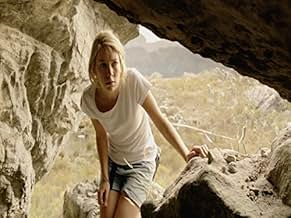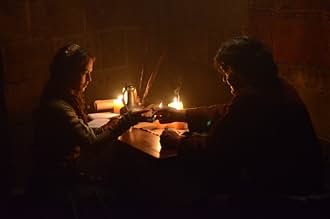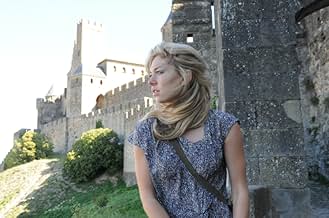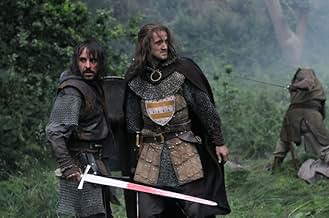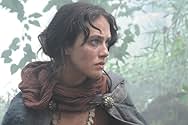Follows two women in two different eras both in search of the Holy Grail.Follows two women in two different eras both in search of the Holy Grail.Follows two women in two different eras both in search of the Holy Grail.
Browse episodes
Featured reviews
First of all, I think the story on Cathars is a brilliant topic for film - barely touched in films. I'm disappointed that not everything was filmed in location (Southern Africa? Why? Languedoc and around wasn't good enough?). The other thing, but it's a personal thing, the archaeological excavations were rubbish - nobody digs like that! (but I'm an archaeologist, so it's my thing). I didn't really enjoy the modern part of the story because of acting - actors and actresses were very stiff and unnatural. It looks like the modern story was directed and filmed by somebody else, but the Medieval part was much better in execution. I give 9 for the Medieval part and 3 for modern part, so it's 6 in general. My opinion is based on the first episode.
Oh dear. How sad. Never mind. Great book. Rubbish film. That just about sums it up for me. Having enjoyed the book so much I was really looking forward to this when I stumbled upon it in the Weekend TV Supplement, but where was the pre-publicity or trailers? Maybe the TV execs knew they had a turkey on their hands when they scheduled it on two consecutive nights over a long weekend when they knew that half the nation would be on holiday. It wasn't all bad - the screenplay was pretty close to the book, which is good, but at nearly 700 pages it is a big ask, and it has to be down to the screenwriter and director to put the story across in an accessible way, and on this occasion I think they have fallen short. The locations, lavish sets, costumes, and the star cast, were all great however. But something was lacking. I wish I could put my finger on it.It was all a bit clichéd. I know the body count was pretty high but there were far too many death-bed scenes when profound words are exchanged just before they croak and the eyes go north. I rarely criticise actors because they can only work with the material they are given but it would help if they could articulate a little more clearly. Without the help of subtitles (and having read the book) I would probably not have had a clue what was going on. Poor Jessica Findlay-Brown has an unfortunate speech defect that when she speaks quietly she breaks into a whisper every other syllable. Very distracting. And central casting please note - Tom Felton, fine actor though he is, does not have the physical presence or vocal gravitas to carry off the part of a warrior leader. And why was it necessary to cast Will as an American? This is a European story about European culture with European settings and characters. No need for a token American. This film will bomb in America anyway with their bite-size attention span. Can you imagine this complex storyline on American TV with adverts every five minutes? The audience will quickly lose the plot if not the will to live! Oh dear. How sad. Never mind. There, I've said it again.
Love the Cathars, would be happy to have one for a neighbour. The concept of liberal Christians that believed in equality for all, accumulation of wealth was bad, sex was healthy and believed in reincarnation is very interesting. The fact that, in the 12/13th century, philosophically they were kicking the roman catholic churches butt says a lot. Tying that in with the holy grail and mixing it in with factual historical references gave this mini series a lot of scope. The reference to carrying our past with us in our blood is very reminiscent of Frank Herbert's Dune and the inference of a genetic memory.
However, the heavy handedness of the direction and use of cliché characters and tropes that did not make sense left me squirming in my seat. Especially in part 1 and the end of part II in the medieval period it felt as if the Cathars had some rabid twitter account saying "Dear bad guys guys want to know all our secrets?....". Yes we know it's the good guys against the bad guys but how come the bad guys seem to know more about what their counterparts are doing than they do? Damn you twitter account!!!
Speaking of which, I felt sorry for Katie McGrath who portrayed a cardboard cut out of her Morgana character in the Merlin series. She's a good looking woman and a fine actress but did she seriously have to lose her clothes so often? She was only one of many flat characters with trite dialogue. There is one scene where she can see someone shake his head in response to a question she asks when she is looking away from him. At this point I was also shaking my head as the dialogue/monologue leading up to this point felt like a quick fix to try to explain her motivation for being such a nasty piece of work and failing miserably.
When it came to the end it felt that I had only seen half the production. It felt as if a whole group of scenes had been cut out and re-spliced leaving me trying to figure how we got to F from A without B, C, D and E. If I'm being kind I would like to think that due to external pressures that a real cracker of a production is out there waiting to be shown at a future date.
As it was I found myself just becoming more frustrated as things made less and less sense. Even the role of the grail in the end becomes diminished except potentially as lesson teacher to humanity.
On the plus side Jessica Brown Findlay playing the medieval heroine was the closest to a fully formed character in the whole story and I'd like to see her in more roles. Production was good especially in the medieval scenes and the filming felt clean and slick. I now feel enlightened as I've had a chance to meet the Cathars, not to be confused with the Kardashians. Giving it 5 out of 10 as I feel like I only saw half of what could have been.
However, the heavy handedness of the direction and use of cliché characters and tropes that did not make sense left me squirming in my seat. Especially in part 1 and the end of part II in the medieval period it felt as if the Cathars had some rabid twitter account saying "Dear bad guys guys want to know all our secrets?....". Yes we know it's the good guys against the bad guys but how come the bad guys seem to know more about what their counterparts are doing than they do? Damn you twitter account!!!
Speaking of which, I felt sorry for Katie McGrath who portrayed a cardboard cut out of her Morgana character in the Merlin series. She's a good looking woman and a fine actress but did she seriously have to lose her clothes so often? She was only one of many flat characters with trite dialogue. There is one scene where she can see someone shake his head in response to a question she asks when she is looking away from him. At this point I was also shaking my head as the dialogue/monologue leading up to this point felt like a quick fix to try to explain her motivation for being such a nasty piece of work and failing miserably.
When it came to the end it felt that I had only seen half the production. It felt as if a whole group of scenes had been cut out and re-spliced leaving me trying to figure how we got to F from A without B, C, D and E. If I'm being kind I would like to think that due to external pressures that a real cracker of a production is out there waiting to be shown at a future date.
As it was I found myself just becoming more frustrated as things made less and less sense. Even the role of the grail in the end becomes diminished except potentially as lesson teacher to humanity.
On the plus side Jessica Brown Findlay playing the medieval heroine was the closest to a fully formed character in the whole story and I'd like to see her in more roles. Production was good especially in the medieval scenes and the filming felt clean and slick. I now feel enlightened as I've had a chance to meet the Cathars, not to be confused with the Kardashians. Giving it 5 out of 10 as I feel like I only saw half of what could have been.
Somber. Poignant. Thought Provoking. I was thinking about the film and its implications long after it was over. It echoes so many repeated events in history of committing acts of violence, all in the name of religion. The crusading party proclaiming itself morally correct and never guilty. To be honest, I never knew about the Cathars and their fate until I watched this miniseries. It really got me interested in learning more about them.
So much criticism from other people and low ratings because the feature was dark and portrayed a harsh reality of a very dark aspect of Christianity. I felt compelled to chime in with the minority of viewers who liked this feature. The film neither revels nor vilifies the darkness and violence of the antagonists. Instead it gives a realistic portrayal of historical events as much as we can know them. This is especially true during the Medieval ages. It was a time rife with examples of religions committing heinous and cruel acts of violence against "non-believers", all in the name of God and Christianity. There are plenty of examples from history where many were converted to Christianity under duress through acts of violence, at a sword point, hanging, beheading, etc. The film takes great care not to go overboard with either the victims or villains portrayal and paints a very haunting picture of medieval France and the Crusades and the Cathar massacres.
The acting was very good across the board for the Medieval portion of the story (with some minor exceptions). Tom Felton as Viscount Trencavel delivered an especially passionate and spirited performance as a noble and charismatic leader of Carcassonne. Jessica Brown Findlay as medieval Alaïs Pelletier du Mas and Emun Elliott as her husband, Guilhem Du Mas brought a very evocative performance as well, making the ending of the story that much more powerful and tragic.
The beautiful soundtrack, scenery and landscapes, believable settings, good costuming along with strong performances all contributed to an engrossing story. Though occasionally slow, the thick as tar tension, atmosphere and believable acting keep the story moving forward and viewers invested in the events and characters.
Perhaps my only one but big complaint was the back and forth switching between medieval and modern times. It was distracting at times, and I did not feel the 2012 events connected well with the past. Some plot points felt contrite and forced to fit the events of 1209 Carcassonne. The whole modern time arch felt just thrown together, not nearly as interesting, and realistic as the past. As if instinctively sensing that the 2012 events really didn't belong in the series, the scriptwriter's and actors' performances and the characters' stories were uninspiring and not nearly as compelling and believable. The modern part of the story did not connect well with the medieval part and was too disjointed to be its own separate story. I just found it too hard to care for its characters. I wish they had focused exclusively on Cathars of medieval Carcassonne. It was a fascinating story, albeit a tragic one, that deserves more coverage.
If you have an interest in history in general or consider yourself a history savant, then grab a cup of soothing chamomile tea and watch the miniseries. I am giving this film a high rating solely based on the strength of the medieval story.
So much criticism from other people and low ratings because the feature was dark and portrayed a harsh reality of a very dark aspect of Christianity. I felt compelled to chime in with the minority of viewers who liked this feature. The film neither revels nor vilifies the darkness and violence of the antagonists. Instead it gives a realistic portrayal of historical events as much as we can know them. This is especially true during the Medieval ages. It was a time rife with examples of religions committing heinous and cruel acts of violence against "non-believers", all in the name of God and Christianity. There are plenty of examples from history where many were converted to Christianity under duress through acts of violence, at a sword point, hanging, beheading, etc. The film takes great care not to go overboard with either the victims or villains portrayal and paints a very haunting picture of medieval France and the Crusades and the Cathar massacres.
The acting was very good across the board for the Medieval portion of the story (with some minor exceptions). Tom Felton as Viscount Trencavel delivered an especially passionate and spirited performance as a noble and charismatic leader of Carcassonne. Jessica Brown Findlay as medieval Alaïs Pelletier du Mas and Emun Elliott as her husband, Guilhem Du Mas brought a very evocative performance as well, making the ending of the story that much more powerful and tragic.
The beautiful soundtrack, scenery and landscapes, believable settings, good costuming along with strong performances all contributed to an engrossing story. Though occasionally slow, the thick as tar tension, atmosphere and believable acting keep the story moving forward and viewers invested in the events and characters.
Perhaps my only one but big complaint was the back and forth switching between medieval and modern times. It was distracting at times, and I did not feel the 2012 events connected well with the past. Some plot points felt contrite and forced to fit the events of 1209 Carcassonne. The whole modern time arch felt just thrown together, not nearly as interesting, and realistic as the past. As if instinctively sensing that the 2012 events really didn't belong in the series, the scriptwriter's and actors' performances and the characters' stories were uninspiring and not nearly as compelling and believable. The modern part of the story did not connect well with the medieval part and was too disjointed to be its own separate story. I just found it too hard to care for its characters. I wish they had focused exclusively on Cathars of medieval Carcassonne. It was a fascinating story, albeit a tragic one, that deserves more coverage.
If you have an interest in history in general or consider yourself a history savant, then grab a cup of soothing chamomile tea and watch the miniseries. I am giving this film a high rating solely based on the strength of the medieval story.
The miniseries deals with two women , modern-day Alice Tanner (Vanessa Kirby) , a volunteer at a French archaeological excavation who finds the skeletal remains of two people in a cave , and medieval Alaïs Pelletier Du Mas (Jessica Findlay) , who lives through the Crusades and Cathar slaughters in medieval France , both of them are seeking the Holy Grail . As there are three sacred books that reveal the secret of the Holy Grail from the Crusaders and various tracks as a labyrinth-engraved ring that lead to resolve the enigmas . In 1209, newly married Alaïs to Guilhem Du Mas is living in Carcassonne , a stronghold of Cathars defended by Viscount Trencavel (Tom Felton). Meanwhile , it is besieged by Simon Monfort (John Lynch) and Guy D'Evreux (Tony Curran) leaders of the Crusaders . Hunted by the Inquisition and deserted by the nobles of their districts, the Cathars became more and more scattered fugitives : meeting surreptitiously in woods and mountain wilds .
This is an epic film mingling actual events along with past happenings by means of a lot of flashbacks ; as while in contemporary time occurs an intrigue starred by Vanessa Kirby , in Middle Age when the city of Carcassona has been declared heretical by the Church being starred by Jessica Findlay , and his nasty sister Katie McGrath . The most interesting moments concern about the historic events dealing with Catharism , a movement that thrived in some areas of Europe , particularly southern France, between the 12th and 14th centuries , the followers were known as Cathars and are now mainly remembered for a prolonged period of persecution , it appeared in Europe in the Languedoc region of France , as here are shown impressive battles and strong massacres , they are the highlights of the movie . Acceptable mini-series , though sometimes result to be pointless , non-sense , and confuse . Based on the bestseller by Kate Mosse who plays a small role as Montsegur Guide . The picture was professionally directed by Christopher Smith , though it has some flaws and gaps .
This one being based on historic facts as : Pope Innocent III attempted to end Catharism by sending missionaries and by persuading the local authorities to act against them . In 1208 Innocent's papal legate Pierre Castelnau was murdered while returning to Rome after excommunicating Count Raymond VI of Toulouse . Pope Innocent III then abandoned the option of sending Catholic missionaries , launched the Albigensian Crusade which all but ended Catharism . The crusader army came under the command, both spiritually and militarily, of the papal legate Arnaud-Amaury. In the first significant engagement of the war, the town of Béziers was besieged . The Catholic inhabitants of the city were granted the freedom to leave unharmed, but many refused and opted to stay alongside the Cathars. Their first target was the lands of the Trencavel, powerful lords of Albi, Carcassonne and the Razes—but a family with few allies in the Midi. Little was thus done to form a regional coalition and the crusading army was able to take Carcassonne, the Trencavel capital, incarcerating Raymond Roger Trencavel in his own citadel where he died , allegedly of natural causes; champions of the Occitan cause from that day to this believe he was murdered . Simon de Montfort was granted the Trencavel lands by the Pope and did homage for them to the King of France, thus incurring the enmity of Peter II of Aragon who had held aloof from the conflict, even acting as a mediator at the time of the siege of Carcassonne. The remainder of the first of the two Cathar wars now essentially focused on Simon's attempt to hold on to his fabulous gains through winters where he was faced, with only a small force of confederates operating from the main winter camp at Fanjeaux, with the desertion of local lords who had sworn fealty to him out of necessity—and attempts to enlarge his newfound domains in the summer when his forces were greatly augmented by reinforcements from northern France, Germany and elsewhere. Summer campaigns saw him not only retake, sometimes with brutal reprisals, what he had lost in the 'close' season, but also seek to widen his sphere of operation—and we see him in action in the Aveyron at St. Antonin and on the banks of the Rhone at Beaucaire. Simon's greatest triumph was the victory against superior numbers at the Battle of Muret—a battle which saw not only the defeat of Raymond of Toulouse and his Occitan allies—but also the death of Peter of Aragon—and the effective end of the ambitions of the house of Aragon/Barcelona in the Languedoc . The Battle of Muret was a massive step in the creation of the unified French kingdom and the country we know today—although Edward III, the Black Prince and Henry V would threaten later to shake these foundations. The Cathars spent much of 1209 fending off the crusaders. The Béziers army attempted a sortie but was quickly defeated, then pursued by the crusaders back through the gates and into the city. The doors of the church of St Mary Magdalene were broken down and the refugees dragged out and slaughtered. Prisoners were blinded, dragged behind horses, and used for target practice. What remained of the city was razed by fire. After the success of his siege of Carcassonne, which followed the Massacre at Béziers in 1209, Simon de Montfort was designated as leader of the Crusader army. Prominent opponents of the Crusaders were Raymond Roger Trencavel, viscount of Carcassonne, and his feudal overlord Peter II, the king of Aragon, who held fiefdoms and had a number of vassals in the region. Peter died fighting against the crusade on 12 September 1213 at the Battle of Muret. Simon Montfort was killed on 25 June 1218 after maintaining a siege of Toulouse for nine months .
This is an epic film mingling actual events along with past happenings by means of a lot of flashbacks ; as while in contemporary time occurs an intrigue starred by Vanessa Kirby , in Middle Age when the city of Carcassona has been declared heretical by the Church being starred by Jessica Findlay , and his nasty sister Katie McGrath . The most interesting moments concern about the historic events dealing with Catharism , a movement that thrived in some areas of Europe , particularly southern France, between the 12th and 14th centuries , the followers were known as Cathars and are now mainly remembered for a prolonged period of persecution , it appeared in Europe in the Languedoc region of France , as here are shown impressive battles and strong massacres , they are the highlights of the movie . Acceptable mini-series , though sometimes result to be pointless , non-sense , and confuse . Based on the bestseller by Kate Mosse who plays a small role as Montsegur Guide . The picture was professionally directed by Christopher Smith , though it has some flaws and gaps .
This one being based on historic facts as : Pope Innocent III attempted to end Catharism by sending missionaries and by persuading the local authorities to act against them . In 1208 Innocent's papal legate Pierre Castelnau was murdered while returning to Rome after excommunicating Count Raymond VI of Toulouse . Pope Innocent III then abandoned the option of sending Catholic missionaries , launched the Albigensian Crusade which all but ended Catharism . The crusader army came under the command, both spiritually and militarily, of the papal legate Arnaud-Amaury. In the first significant engagement of the war, the town of Béziers was besieged . The Catholic inhabitants of the city were granted the freedom to leave unharmed, but many refused and opted to stay alongside the Cathars. Their first target was the lands of the Trencavel, powerful lords of Albi, Carcassonne and the Razes—but a family with few allies in the Midi. Little was thus done to form a regional coalition and the crusading army was able to take Carcassonne, the Trencavel capital, incarcerating Raymond Roger Trencavel in his own citadel where he died , allegedly of natural causes; champions of the Occitan cause from that day to this believe he was murdered . Simon de Montfort was granted the Trencavel lands by the Pope and did homage for them to the King of France, thus incurring the enmity of Peter II of Aragon who had held aloof from the conflict, even acting as a mediator at the time of the siege of Carcassonne. The remainder of the first of the two Cathar wars now essentially focused on Simon's attempt to hold on to his fabulous gains through winters where he was faced, with only a small force of confederates operating from the main winter camp at Fanjeaux, with the desertion of local lords who had sworn fealty to him out of necessity—and attempts to enlarge his newfound domains in the summer when his forces were greatly augmented by reinforcements from northern France, Germany and elsewhere. Summer campaigns saw him not only retake, sometimes with brutal reprisals, what he had lost in the 'close' season, but also seek to widen his sphere of operation—and we see him in action in the Aveyron at St. Antonin and on the banks of the Rhone at Beaucaire. Simon's greatest triumph was the victory against superior numbers at the Battle of Muret—a battle which saw not only the defeat of Raymond of Toulouse and his Occitan allies—but also the death of Peter of Aragon—and the effective end of the ambitions of the house of Aragon/Barcelona in the Languedoc . The Battle of Muret was a massive step in the creation of the unified French kingdom and the country we know today—although Edward III, the Black Prince and Henry V would threaten later to shake these foundations. The Cathars spent much of 1209 fending off the crusaders. The Béziers army attempted a sortie but was quickly defeated, then pursued by the crusaders back through the gates and into the city. The doors of the church of St Mary Magdalene were broken down and the refugees dragged out and slaughtered. Prisoners were blinded, dragged behind horses, and used for target practice. What remained of the city was razed by fire. After the success of his siege of Carcassonne, which followed the Massacre at Béziers in 1209, Simon de Montfort was designated as leader of the Crusader army. Prominent opponents of the Crusaders were Raymond Roger Trencavel, viscount of Carcassonne, and his feudal overlord Peter II, the king of Aragon, who held fiefdoms and had a number of vassals in the region. Peter died fighting against the crusade on 12 September 1213 at the Battle of Muret. Simon Montfort was killed on 25 June 1218 after maintaining a siege of Toulouse for nine months .
Did you know
- TriviaIn episode 2, Kate Mosse, the author of the book on which the mini-series is based, makes a cameo as a tour guide.
- How many seasons does Labyrinth have?Powered by Alexa
Details
- Release date
- Countries of origin
- Language
- Also known as
- Kate Mosse's Labyrinth
- Filming locations
- Production companies
- See more company credits at IMDbPro
Contribute to this page
Suggest an edit or add missing content


